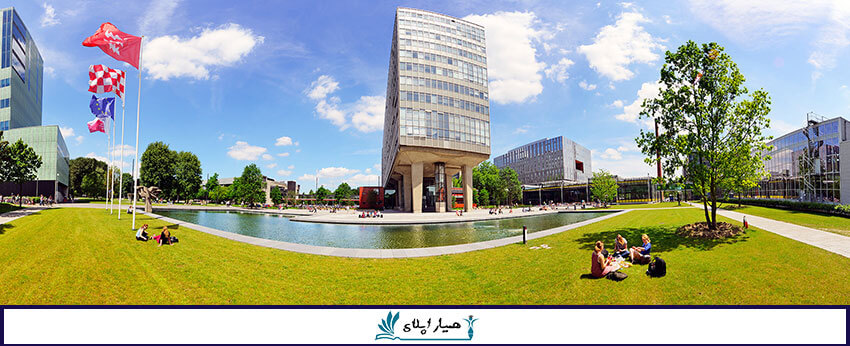فول فاند دکتری دانشگاه ایندهون هلند
PhD Illumination Optics Freeform light guides for homogeneous illumination
بورسیه تحصیلی دکترا دانشگاه ایندهون هلند | تحصیل در هلند دکترا | بورسیه تحصیلی در هلند
شرح شغل :
بورسیه تحصیلی دکترا دانشگاه ایندهون هلند : گروه ریاضیات و علوم رایانه دانشگاه صنعتی ایندهون دارای جایگاه برای دانشجوی دکتری در مرکز آنالیز، محاسبات علمی و برنامه های کاربردی (CASA) است.
CASA شامل کرسی علمی محاسبات (SC) و تجزیه و تحلیل کاربردی (TA) است. هدف اصلی این تحقیق توسعه جدید و بهبود روش های ریاضی موجود (هر دو روش تحلیلی و عددی) برای طیف گسترده ای از برنامه های کاربردی در علوم و مهندسی است. هدف از این پروژه و فرصت تحصیلی در هلند، گسترش روش های حلی به معادله لیووی چهار بعدی و استفاده از این روش ها برای هدایت های موج است.
 الزامات شغلی بورسیه تحصیلی دکترا دانشگاه ایندهون هلند:
الزامات شغلی بورسیه تحصیلی دکترا دانشگاه ایندهون هلند:
- کارشناسی ارشد ریاضیات (کاربردی)، فیزیک یا رشته مرتبط با زمینه قوی در فیزیک محاسباتی؛
- تجربه با Matlab و ترجیحا C یا C ++؛
- داری خلاقیت و مهارت های تحلیلی خوب.
- مهارت های ارتباطی خوب به زبان انگلیسی، در رایتینگ و اسپیکینگ
مزایا و دستمزد:
مزایا و دستمزد مربوط به بورسیه تحصیلی دکترا دانشگاه ایندهون هلند به شکل زیر است:
- انتصاب تمام وقت برای مدت چهار سال، با ارزیابی متوسط پس از نه ماه؛
- حقوق سالانه یورو 2325 در هر ماه در سال اول افزایش به 2772 یورو در هر ماه در سال چهارم؛
- حمایت از توسعه شخصی و برنامه ریزی حرفه ای از جمله دوره ها، مدارس تابستانی، بازدید های کنفرانس و …؛
- یک موقعیت پژوهشی در یک گروه تحقیقاتی مشتاق و مشهور بین المللی؛
- یک بسته گسترده از مزایای حاشیه ای
مدارک مورد نیاز برای درخواست بورسیه تحصیلی دکترا دانشگاه ایندهون هلند:
- نامه انگیزشی؛
- رزومه تحصیلی؛
- کپی دانشنامه و لیست نمرات ؛
- نام و آدرس دو داور؛
- اثبات مهارت های زبان انگلیسی (در صورت امکان).
فرصت تحصیلی پسا دکتری فیزیک کوانتوم در دانشگاه آمستردام هلند
بورس تحصیلی دانشگاه توئنته هلند | University Twente Scholarship
موارد مرتبط با بورسیه تحصیلی دکترا دانشگاه ایندهون هلند :
Job description
The Department of Mathematics and Computer Science of Eindhoven University of Technology has a vacancy for a PhD-student in its Centre for Analysis, Scientific computing and Applications (CASA). CASA comprises the chairs Scientific Computing (SC) and Applied Analysis (TA). Its major research objective is to develop new and to improve existing mathematical (both analytical and numerical) methods for a wide range of applications in science and engineering.
Background
Illumination optics plays an important role in modern society. Products like mobile phones, lamps, car headlights, road lighting and even satellites all utilize illumination optics. A good optical design determines, for example, the energy efficiency of illumination devices, the minimization of light pollution or the sensitivity of sensors in satellites. The design of novel, sophisticated optical systems requires advances in the mathematical description and numerical simulation methods for these systems.
The optics applied in illumination is nonimaging, in contrast to for example a camera lens which is imaging. In nonimaging optics we study the transfer of light from a source to a target. The key problem is to design optical systems that convert a given source intensity into a desired target intensity.
A modern trend in illumination optics is to use scattering elements in addition to commonly used refractive (lenses) or reflective (mirrors) optical components. For example, in LED lighting systems scattering surfaces are used to hide too bright light sources and to redistribute the light. The physical description of scattering surfaces, on the one hand,
and refractive/reflective surfaces, on the other hand, is quite different.
To bridge the gap between the corresponding subdisciplines scattering and geometrical optics, an NWO/TTW perspectief project was proposed by UT, TU Delft and TU/e, called Free-Form Scattering Optics. This proposal is supported by leading parties in the illumination industry: TNO, ASML, Signify, Lumileds, Demcon and Schott. In this project 12 PhD students work on different topics related to a) the fundamentals of scattering, b) the fundamentals of free-form optics, c) homogenization and diffusion and d) control the direction of light by interference.
This PhD project relates to the work package c) homogenization and diffusion.
Project Description
An alternative description of the propagation of light in an optical system is based on the phase space representation of the system. In this representation, each ray is defined by one or two space and direction coordinates, thus constituting a two or four dimensional phase space. The propagation of one ray can be described by the movement of a point in phase space, and the propagation of an entire beam can be interpreted as a ’flow’ in phase space. This flow is governed by Liouville’s equation, which is a first order hyperbolic conservation law. Sophisticated solution methods for the two-dimensional equation exist.
The purpose of this research project is to extend the solution methods to the fourdimensional Liouville equation and to apply these methods to wave guides. More specifically, the Liouville solvers should be combined with methods from optimal control to design wave guides that create a homogeneous light output.
As a PhD student your tasks are the following:
Perform scientific research in the described domain;
Present results at international conferences;
Publish results in scientific journals;
Participate in activities of the group and the department;
Assist SC-staff in teaching undergraduate and graduate courses (at most 20 % of the time).
Job requirements
Requirements
We are looking for talented, enthusiastic PhD candidates who meet the following requirements:
An MSc in (applied) mathematics, physics or a related discipline with a strong background in computational physics;
Experience with Matlab and preferably C or C++;
Creative, pro-active team player with good analytical skills;
Good communicative skills in English, both written and oral.
Conditions of employment
Appointment and salary
We offer
A full-time appointment for a period of four years, with an intermediate evaluation after nine months;
A gross salary of Euros 2325 per month in the first year increasing up to Euros 2,972 per month in the fourth year;
Support for your personal development and career planning including courses, summer schools, conference visits, etc.;
A research position in an enthusiastic and internationally renowned research group;
A broad package of fringe benefits (e.g. excellent technical infrastructure, saving schemes, excellent sport facilities, and child daycare).
Information and application
More information
About the project, please contact dr.ir. Jan ten Thije Boonkkamp (TUE), email: j.h.m.tenthijeboonkkamp [at] tue.nl, tel. +31402474123 or prof.dr.ir. Wilbert IJzerman (Signify), email: wilbert.ijzerman [at] signify.com, tel. +31610183927.
About employment conditions, please contact mrs. Marjolein von Reth, email: pzwin [at] tue.nl.
Application
The application should consist of the following parts:
A motivation letter;
A Curriculum Vitae;
Copies of diplomas and a list of grades of your studies;
Names and addresses of two referees;
Proof of English language skills (if applicable).
Please keep in mind you can upload only 5 documents up to 2 MB each. If necessary please combine documents.
Deadline for application: January 31, 2019, however, the call will remain open until the vacancy has been filled.
پیشنهاد مطالعه: پرداخت اپلیکیشن فی




